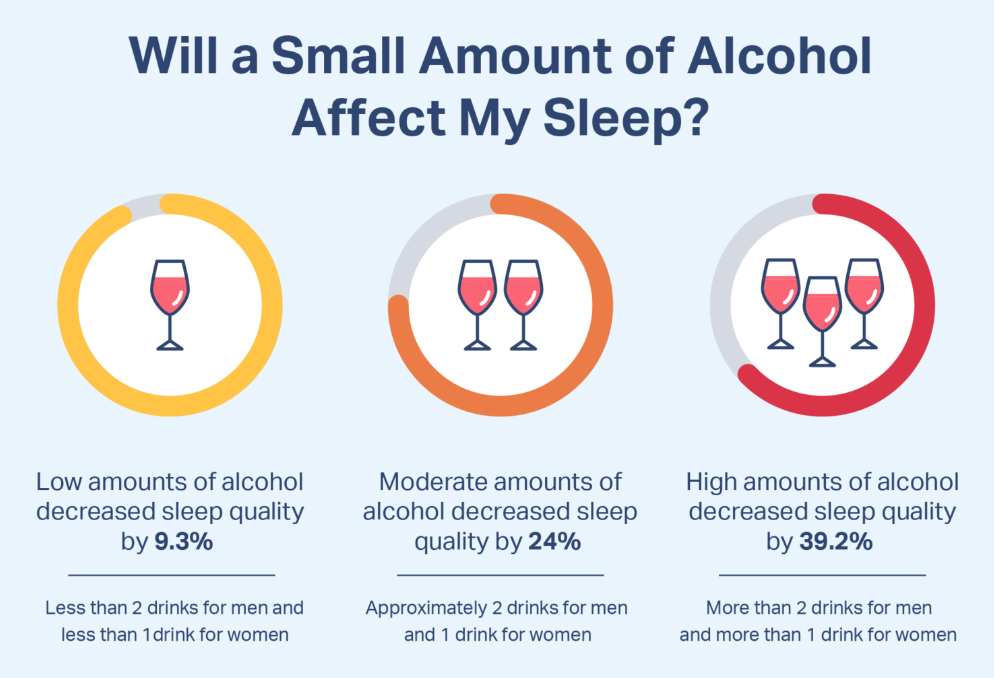Choosing a healthier life: embracing Sober October
What is Sober October?
“Sober October is an 18+ fundraising campaign aimed at challenging social drinkers to change their habits for a month and make some healthy lifestyle changes.”
Impacts of alcohol consumption
As a depressant, alcohol disrupts the balance of neurotransmitters in the brain, affecting mood regulation and increasing the risks of depression and anxiety (Mental Health Foundation). As “one of the most powerful suppressors of REM sleep”, alcohol drastically reduces complex memory integration and association (Walker, 2018). Even small amounts of alcohol can have strong impacts on sleep quality (Sleep Foundation, 2023):
Effect of different amounts of alcohol on sleep quality, taken from Sleep Foundation.
And it isn’t just sleep that is affected. Below we revisit some alarming statistics on UK alcohol habits, and the negative physical, mental and financial health impacts of such levels of consumption.
Just how much alcohol does the UK population consume?
According to a 2019 WHO study, the average consumption in the UK (across both sexes) is 11.45 litres of pure alcohol per capita each year. This equates to approximately 400 pints of medium-strength (5.0% ABV) beer or 545 medium (175ml) glasses of typical-strength (12.0% ABV) wine each year.
However, 20.4% of ONS survey respondents claim that they do not drink alcohol at all, which would mean that the average drinker in the UK actually consumes closer to 506 pints of beer or 689 medium glasses of wine.
The same WHO study shows that men drink around 4x more alcohol (volume) per year than women - 17.74 litres compared to 5.4 litres. So, the average male drinker may even consume 625 pints or 845 medium glasses of wine.
What are the effects of such consumption?
Alcohol misuse is the biggest risk factor for disability, ill-health and death for 15-49 year-olds in the UK (Public Health England)
There are, on average, 542 UK deaths by suicide per year in mental health patients with a history of alcohol misuse, accounting for around 10% of all deaths by suicide in England (Gov UK, 2020)
The average drinker in the UK spends around £63,000 on alcohol over their lifetime (Opinium, for Alcohol Change UK, 2023)
19% of UK adults would consider alcohol to be an “essential” item in their shopping basket (same as above)
Benefits of reducing or stopping alcohol consumption
Drinkaware outline a plethora of short-term and long-term benefits for those who stop drinking alcohol:
In the short-term, individuals will no longer suffer from hangovers, swapping the usual tiredness, nausea and headaches for better mood and increased productivity. They will also typically report lower stress levels, improved energy levels, better sleep quality, better skin appearance, and reduced weight. Indeed, after just 4 weeks, participants in the One Year No Beer challenge report an average loss of 3kg and 40% of liver fat.
In the long-term, individuals will lower their risk of liver disease, sexual dysfunction, stroke, cardiovascular disease and high blood pressure. There is also the matter of money saved - imagine what else you could do with that £63,000!
Below are some of the benefits reported by participants in the One Year No Beer challenge after just 90 days.
You can click through to read inspirational stories and the benefits reported by individuals who completed the full 365 days.
Attempting to cut out or reduce alcohol
So we’ve discussed the physical, mental and financial impacts of alcohol consumption, and the huge range of benefits reported by those who have stopped drinking. But stopping drinking is easier said than done; the One Year No Beer and Macmillan Go Sober teams would be the first to admit that.
However, thanks to organisations such as these, awareness around the negative health impacts of alcohol spreads, the stigma around teetotalism is gradually being eroded, and the community of like-minded others in the same boat as you continues to grow.
Common comments given by people trying to stop drinking, taken from OYNB.
Have you ever caught yourself saying one or more of the above?
It’s easy to make an excuse not to stop, which is quite often centred around the fear of missing out (FOMO). But One Year No Beer argue that “you’re actually missing out on being the best version of yourself”.
With a positive psychology approach and the right support network, ONYB argue that anyone can break past these common excuses and reap the benefits of their Challenge. You also needn’t lose the social life you cherish: why not try non-alcoholic alternatives to your usual drinks such as Guinness 0.0% or a ‘Nojito’ mocktail?
Closing remarks
We’ve explored the huge range of physical, mental and financial benefits of giving up the booze. So why not become a Soberhero this October or sign up to the One Year No Beer challenge? See Drinkaware’s advice on how to get started on your alcohol-free journey.
October also sees ‘Stoptober’ campaigns, whereby participants attempt to quit smoking for the month. If you usually smoke and drink, then why not double up and attempt to quit both? You can explore the myriad of health benefits of quitting smoking, as laid out by the NHS.




